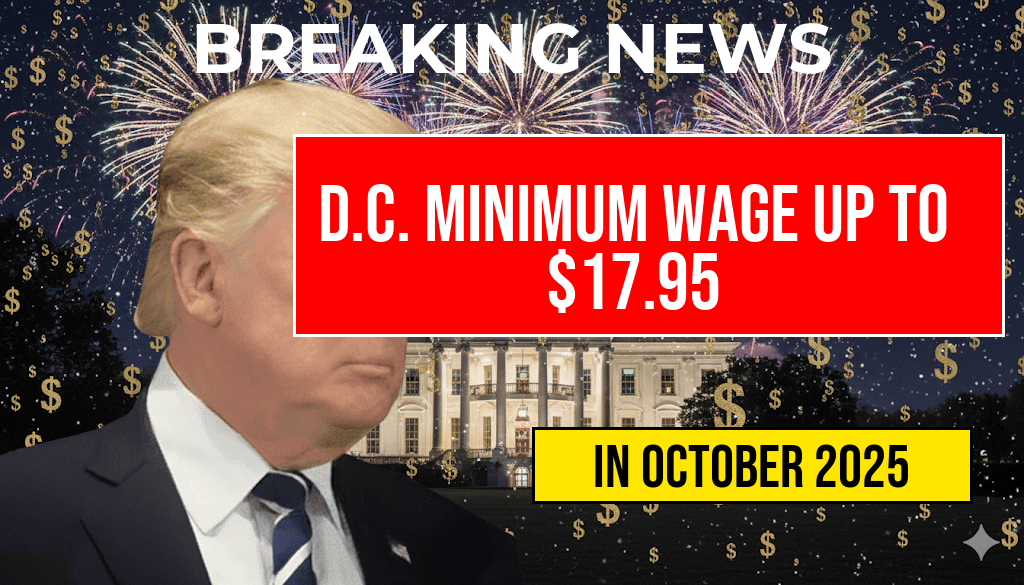Washington, D.C. Raises Minimum Wage to $17.95, Boosting Worker Earnings by Nearly $1,000 Annually
The District of Columbia’s minimum wage increased effective July 1, 2024, reaching $17.95 per hour. This adjustment translates into an additional $0.45 per hour for full-time workers, amounting to approximately $936 more annually for those earning the minimum. The raise aligns with D.C.’s ongoing efforts to ensure a living wage amid rising living costs and inflationary pressures. Employers and employees alike are adjusting to these changes, which aim to reduce wage disparity and support economic stability within the city.
The increase was authorized through legislation passed earlier this year by the D.C. Council, reflecting a broader trend among U.S. jurisdictions to revise minimum wages regularly. For a full-time worker clocking 40 hours weekly, this hike means a recognition of the evolving economic landscape, providing some relief as inflation persists. The new wage floor is part of the city’s strategy to promote fair compensation, especially amid the ongoing housing affordability crisis and rising costs of day-to-day essentials.
Details of the Wage Adjustment
| Previous Minimum Wage | New Minimum Wage | Hourly Increase | Annual Additional Earnings (based on 40 hours/week) |
|---|---|---|---|
| $17.50 | $17.95 | $0.45 | $936 |
The city’s minimum wage has seen gradual increases over the past five years, with the current adjustment marking a continued commitment to wage growth for low-income workers. The incremental approach aims to balance economic growth with support for essential workers, many of whom face high housing costs and limited disposable income.
Impacts on Local Economy and Workforce
Analysts suggest that the wage hike could lead to multiple ripple effects across D.C.’s economy. Increased earnings may improve workers’ purchasing power, potentially boosting local retail and hospitality sectors. However, some business owners express concern about increased labor costs, particularly small businesses operating on tight margins.
“While the wage increase is a positive step toward economic equity, it’s crucial for policymakers to monitor its impact on employment levels and business viability,” notes economic analyst Wikipedia. Historically, modest minimum wage hikes have had limited negative effects on employment, but ongoing assessments are vital to ensure sustainable growth.
Broader Context and Future Outlook
The D.C. minimum wage increase aligns with a nationwide trend, where cities and states reevaluate wage policies annually. The U.S. Department of Labor highlights that as of 2024, more than 30 states have set minimum wages above the federal level of $7.25, reflecting regional economic conditions and cost of living.
Looking ahead, discussions continue regarding further increases. Some advocates are pushing for a gradual rise to $20 per hour within the next few years, citing inflation and income inequality concerns. Conversely, business groups urge caution, emphasizing the need to balance fair wages with economic resilience.
Implications for Workers and Employers
- For workers: The wage increase means more take-home pay, reducing financial stress and enhancing quality of life for low-income earners.
- For employers: Adjustments in payroll expenses may lead to shifts in staffing or pricing strategies, especially among small businesses.
- For policymakers: The change underscores ongoing efforts to address income disparities while fostering economic stability.
Overall, the new minimum wage in D.C. reflects a strategic move to support workers amid economic challenges and rising living costs. As the city navigates these changes, stakeholders across sectors will need to collaborate to ensure that wage policies promote sustainable growth and equitable prosperity.
For additional insights on minimum wage policies and economic trends, visit Bureau of Labor Statistics and Wikipedia’s overview of minimum wages in the U.S..
Frequently Asked Questions
What is the new minimum wage in Washington D.C.?
The minimum wage in Washington D.C. has increased to $17.95 per hour.
By how much has the D.C. minimum wage increased?
The minimum wage has risen by $0.45 per hour.
How much additional annual income does the wage increase provide?
The increase results in an additional $936 annually for full-time workers earning the minimum wage.
When did the minimum wage increase take effect?
The wage increase took effect on [Insert Effective Date] (Note: replace with actual date if available).
Who is affected by the minimum wage increase in D.C.?
The minimum wage increase primarily impacts minimum wage workers across various industries in Washington D.C., including retail, hospitality, and service sectors.

Leave a Reply